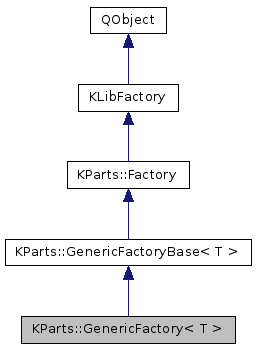KParts
#include <genericfactory.h>

Public Member Functions | |
| GenericFactory () | |
| virtual KParts::Part * | createPartObject (QWidget *parentWidget, QObject *parent, const char *className, const QStringList &args) |
 Public Member Functions inherited from KParts::GenericFactoryBase< T > Public Member Functions inherited from KParts::GenericFactoryBase< T > | |
| GenericFactoryBase () | |
| virtual | ~GenericFactoryBase () |
| virtual KComponentData | partComponentData () |
 Public Member Functions inherited from KParts::Factory Public Member Functions inherited from KParts::Factory | |
| Factory (QObject *parent=0) | |
| virtual | ~Factory () |
| Part * | createPart (QWidget *parentWidget=0, QObject *parent=0, const char *classname="KParts::Part", const QStringList &args=QStringList()) |
Additional Inherited Members | |
 Static Public Member Functions inherited from KParts::GenericFactoryBase< T > Static Public Member Functions inherited from KParts::GenericFactoryBase< T > | |
| static KAboutData * | aboutData () |
| static const KComponentData & | componentData () |
 Static Public Member Functions inherited from KParts::Factory Static Public Member Functions inherited from KParts::Factory | |
| static KComponentData | partComponentDataFromLibrary (const QString &libraryName) |
 Protected Member Functions inherited from KParts::GenericFactoryBase< T > Protected Member Functions inherited from KParts::GenericFactoryBase< T > | |
| virtual KComponentData * | createComponentData () |
 Protected Member Functions inherited from KParts::Factory Protected Member Functions inherited from KParts::Factory | |
| virtual QObject * | createObject (QObject *parent=0, const char *classname="QObject", const QStringList &args=QStringList()) |
Detailed Description
template<class T>
class KParts::GenericFactory< T >
A template for a KParts::Factory implementation.
It implements the pure virtual createPartObject method by instantiating the template argument when requested through the className field. In addition it is a container for a part's KComponentData object, by providing a static KComponentData componentData() method.
The template argument has to inherit from KParts::Part and has to implement two methods: 1) There needs to be a public constructor with the following signature: MyPart( QWidget *parentWidget, QObject *parent, const QStringList& args )
2) It needs to provide one static method to create a KAboutData object per request, holding information about the component's name, its authors, license, etc. The signature of that static method has to be KAboutData *createAboutData()
The template will take care of memory management of the KComponentData and the KAboutData object, meaning ownership of what createAboutData returns is passed to the caller (this template) .
For advanced use you can also inherit from the template and re-implement additionally the virtual KComponentData createComponentData() method, for example in case you want to extend the paths of your instance's KStandardDirs object.
If a KParts::ReadOnlyPart is requested through this factory and the template argument implements a KParts::ReadWritePart then setReadWrite( false ) will automatically be called in createPartObject.
Use the factory through the K_EXPORT_COMPONENT_FACTORY macro, like that:
yourlibrary is the library name that you compiled your KPart into.
Definition at line 110 of file genericfactory.h.
Constructor & Destructor Documentation
|
inline |
Definition at line 113 of file genericfactory.h.
Member Function Documentation
|
inlinevirtual |
Reimplement this method in your implementation to create the Part.
The QStringList can be used to pass additional arguments to the part. If the part needs additional arguments, it should take them as name="value" pairs. This is the way additional arguments will get passed to the part from eg. khtml. You can for example emebed the part into HTML by using the following code:
This could result in a call to
- Returns
- the newly created part.
Implements KParts::Factory.
Definition at line 115 of file genericfactory.h.
The documentation for this class was generated from the following file:
Documentation copyright © 1996-2014 The KDE developers.
Generated on Tue Oct 14 2014 22:50:42 by doxygen 1.8.7 written by Dimitri van Heesch, © 1997-2006
KDE's Doxygen guidelines are available online.
 KDE API Reference
KDE API Reference